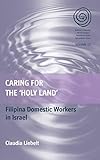Caring for the 'Holy Land' : Filipina Domestic Workers in Israel / Claudia Liebelt.
Material type: TextSeries: EASA Series ; 17Publisher: New York ; Oxford : Berghahn Books, [2011]Copyright date: ©2011Description: 1 online resource (228 p.)Content type:
TextSeries: EASA Series ; 17Publisher: New York ; Oxford : Berghahn Books, [2011]Copyright date: ©2011Description: 1 online resource (228 p.)Content type: - 9780857452610
- 9780857452627
- 331.4/8164089992105694
- HD6072.2.I75
- online - DeGruyter
| Item type | Current library | Call number | URL | Status | Notes | Barcode | |
|---|---|---|---|---|---|---|---|
 eBook
eBook
|
Biblioteca "Angelicum" Pont. Univ. S.Tommaso d'Aquino Nuvola online | online - DeGruyter (Browse shelf(Opens below)) | Online access | Not for loan (Accesso limitato) | Accesso per gli utenti autorizzati / Access for authorized users | (dgr)9780857452627 |
Frontmatter -- Contents -- List of Illustrations -- List of Abbreviations -- Preface -- Introduction -- Chapter 1 The Israeli Migration Regime: On Foreign Workers and Migrants -- Chapter 2 Transnational Female Lives -- Chapter 3 Caring for the ‘Holy Land’ -- Chapter 4 On Weekends, Together: The Making and Unmaking of a Filipino Community -- Chapter 5 Feeling Manila, Living in Hiding and Appropriating the Black Part of the ‘White City’: Filipinos in Tel Aviv -- Chapter 6 Global Dreaming -- Conclusion -- Glossary -- Bibliography -- Index
restricted access online access with authorization star
http://purl.org/coar/access_right/c_16ec
In Israel, as in numerous countries of the global North, Filipina women have been recruited in large numbers for domestic work, typically as live-in caregivers for the elderly. The case of Israel is unique in that the country has a special significance as the ‘Holy Land’ for the predominantly devout Christian Filipina women and is at the center of an often violent conflict, which affects Filipinos in many ways. In the literature, migrant domestic workers are often described as being subject to racial discrimination, labour exploitation and exclusion from mainstream society. Here, the author provides a more nuanced account and shows how Filipina caregivers in Israel have succeeded in creating their own collective spaces, as well as negotiating rights and belonging. While maintaining transnational ties and engaging in border-crossing journeys, these women seek to fulfill their dreams of a better life. During this process, new socialities and subjectivities emerge that point to a form of global citizenship in the making, consisting of greater social, economic and political rights within a highly gendered and racialized global economy.
Mode of access: Internet via World Wide Web.
In English.
Description based on online resource; title from PDF title page (publisher's Web site, viewed 25. Jun 2024)


